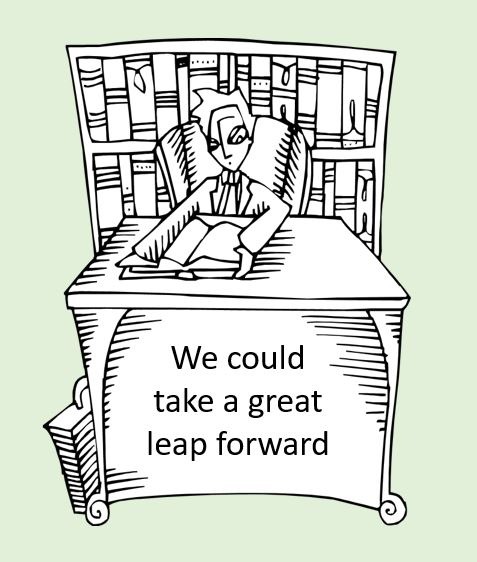The thinking of Comrade F. Dobler from the early 20th century remains relevant and even prescient: those who need open access to information may be those who are fundamentally excluded from public libraries.

The new model public library
Open for all? offers a “think piece” rather than an intellectual analysis. Columnist John Pateman shares his personal observations on issues, and his columns are designed to promote discussion and professional debate. He has arrived at his conclusions after 40 years of working in public libraries of/in all types and locations.
When Britain last had a recession in 2008, the consequences included hundreds of public library closures and thousands of library workers being laid off. The library service that I managed at that time was reduced from 48 to 15 libraries. Canada dodged that particular bullet but may not be so lucky this time around; someone will have to pay for all the government money being used to get us through the COVID-19 crisis. This will usher in a newer, longer and deeper era of austerity and a new understanding of what defines a “model public library”.
Our current health crisis is having a profound socioeconomic impact. Not only has public spending increased in the short term (with inevitable long term consequences) but we are also witnessing severe cracks in a funding model that has under-invested in critical public health areas such as infectious disease testing and long-term care. Any money that is left over after we pay back the pandemic-induced deficit is likely to end up in health care services rather than public libraries, which are rarely very high on municipal, provincial, and federal agendas and priorities.

The Federation of Ontario Public Libraries (FOPL) is already signalling that one of the potential consequences of the pandemic could be municipal tax base damage or collapse:
“We hope that this is the most fearsome scenario. At this point, we are assured that the provincial Public Library operating grants are not affected, but these represent an aggregate of less than 4% of public library funding in Ontario. With retail, tourism, and restaurants being mostly closed, HST collection is severely impacted. Income taxes will be impacted by historically high unemployment that will only return gradually. Municipal revenues on property taxes, business taxes, building permits, licenses, hall rentals, etc. are way down. Also, social service spending (EI, welfare, etc.) is an increasing drain on the budgets of all levels of government. This can be easily predicted to have an impact on our largely municipally-funded finances (and we are already seeing the planning and effects of this on short-term furloughs and layoffs).” A Roadmap Reimagined: Scenario Planning for Post-COVID-19 Ontario Public Libraries.
FOPL says that, in this scenario, we may need to get very real about fundraising, charitable status foundations, sponsorships, and promoting the role of the public library to reduce major cuts. Now is the time for public library boards and management to strengthen their relationships with their business community, partners, CUPE locals, and government. Collectively, staff and administrators must plan, target and communicate.
But we don’t need to think about our current crisis as being all “doom and gloom”. We also have a golden opportunity to develop new models of public library service delivery that are not shackled by that familiar, and now redundant, mantra that “we have always done things this way”. The old ways will no longer work in the post-coronavirus environment. This could lead to a cultural revolution in how we design and deliver our library services.
Now is the time to ditch what Mao called the four “olds”—old customs, old culture, old habits and old ideas—and build a new model public library that can meet the needs of all sections of the community. In planning for this “great leap forward,” we must redefine and reposition libraries as multiple purpose community hubs working in partnership with a wide range of community organizations.
 When libraries become community hubs, we will see even more significant changes. For example:
When libraries become community hubs, we will see even more significant changes. For example:
1. The library as physical space will be transformed, both in terms of what is (and is not) in that space, and there will be a big shift towards virtual use, online resources and programming, and community outreach and development.
2. At long last, fines (which are the biggest barrier to library use), must be abolished.
3. Staff members will need to be reoriented and retrained. For example, the day of the big public service desk is over and self service will become the new norm. Contactless circulation will replace the line up at the desk and CCTV and automated access control systems will enable the community to use libraries outside of the core staffed open hours.
What this crisis lockdown has proven is that all library workers–not just senior and middle managers–can work remotely and the working week will become a blend of in-library and home working. This will improve work/life balance and mental well being. The hiring requirements will shift from professional qualifications to lived experience.
Library strategies, policies, procedures, structures and systems will need to be torn up and redesigned from scratch with input from staff and the community. These will need to be flexible, adaptable and nimble in the face of rapidly changing circumstances. What is “true” today may not be so tomorrow, and what used to be clear and consistent will now become blurred and organic. The status quo will be replaced by disruption and constant waves of change to respond to a fast moving external environment. This will create what Mao called a permanent revolution because “‘disequilibrium is a general, objective rule. Disequilibrium is normal and absolute whereas equilibrium is temporary and relative”.
These changes will enable the new model library to demonstrate its worth in the uncertain and turbulent months and years ahead.
Road map photo by Tabea Damm on Unsplash
John Pateman is the CEO of the Thunder Bay Public Library. He is also the author of the Open for All? column in Open Shelf.
